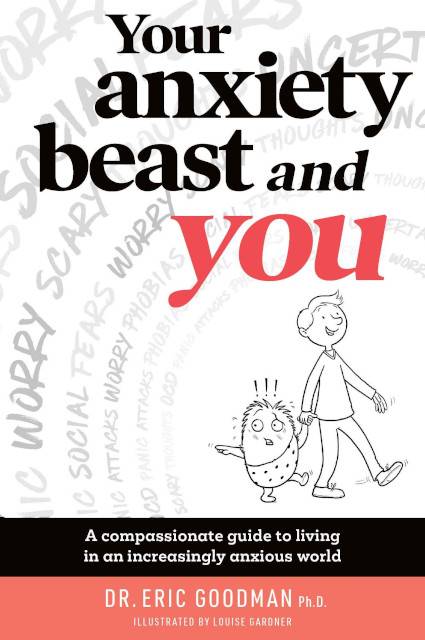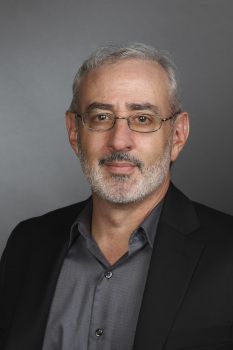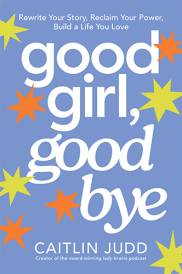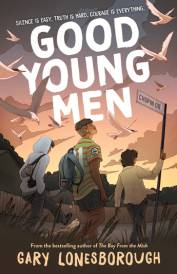Your Anxiety Beast and You Interview

Your Anxiety Beast and You is a kinder, more compassionate approach for people suffering from anxiety.
Don't live with an enemy inside your mind, see anxiety for what it really is"an inner hero. It tries to protect you from threats but gets confused about what the true threats are. Learn to cope and train your anxiety to be a better inner-companion through methods based on compassion-focused therapy, CBT and ACT with humour and compassion.
About the author:
Dr. Eric Goodman, Ph.D., is a clinical psychologist, author, and speaker who specializes in helping people face their social fears and anxiety disorders. He has been a lecturer at Northeastern University and California Polytechnic State University. In addition to his private practice in San Luis Obispo, California, he runs Social Courage groups and retreats. He is the author of Social Courage: Coping and thriving with the reality of social anxiety (Exisle). He lives in San Luis Obispo with his wife, three kids, dog, and their anxiety beasts.
Your Anxiety Beast and You
Exisle Publishing
Author: Dr. Eric Goodman
ISBN: 9781925820331
RRP: $32.99
Exisle Publishing
Author: Dr. Eric Goodman
ISBN: 9781925820331
RRP: $32.99
Interview with Dr. Eric Goodman
Question: Why did you write Your Anxiety Beast and You?
Dr. Eric Goodman : I wrote Your Anxiety Beast and You to counter the narrative that anxiety is something malicious, that it is working against you"trying to impair your life. This message (that is pervasive in modern society) turns anxiety into a threat. Whatever is perceived to be a threat is met with even more anxiety! Since anxiety is a normal part of life for most of us, we are walking around feeling extra anxious about our anxiety.
Taking a more understanding and compassionate approach to anxiety leads us to suffer less. When we focus on compassion rather than trying to forever rid ourselves of anxiety, we can decrease our distress.
Question: What can you tell us about anxiety?
 Dr. Eric Goodman : Not only is anxiety itself normal (though we can have a phobic relationship with it) it is a necessary part of human survival. The problem is that it is very glitchy.
Dr. Eric Goodman : Not only is anxiety itself normal (though we can have a phobic relationship with it) it is a necessary part of human survival. The problem is that it is very glitchy.
We've been on this earth for around a couple million years or so (in one form or another) and during most of human experience the world was a hostile, dangerous place. Our anxiety (our fight-or-flight-or-freeze systems) were adapted to survive in prehistoric, dangerous times. The modern world has only been around for a tiny fraction of the time that humans have roamed the planet.
Our anxiety still functions on prehistoric time!
When it perceives a threat, it pumps us full of stress hormones to focus our resources (attention, energy, strength, and power) on survival. In today's world, however, most of the time it is misperceiving threats. It means well. It is like having our own overzealous bodyguard working full-time for us. Unfortunately, this bodyguard has the insight of an over-sugared toddler.
Most of the time, our anxiety misunderstands the complexity of modern situations. There is no reason to get flooded with adrenalin when public speaking in front of colleagues, asking someone on a date, or even riding a rollercoaster. However, occasionally, your anxiety gets it right--like when you are driving on the highway and the car in front of you suddenly slams on its breaks"your anxiety leaps into action, giving you the best chance of survival.
Question: What's the main message you hope readers take from Your Anxiety Beast and You?
Dr. Eric Goodman : Rather than hating your anxiety, you are better off making it a more soothing home in your nervous system. Rather than fighting with your anxiety, teach it using exposure therapy. Rather than avoiding important things that make you anxious"take your anxiety by the hand and gently bring it with you as you live your best life.
Question: Can you share some tips with us, featured in the book?
Dr. Eric Goodman : Understand that anxiety is not your enemy and not your fault. You are not weak or broken because of your anxiety"you are human! Try to go from struggling to get rid of an "enemy" to seeing anxiety as your glitchy, but well-meaning "companion."
When anxiety wakes up, rather than tightening your muscles, fighting, or hating your inner experience, soften and hold your anxiety gently (like holding a crying baby). Notice any part of your body that is tensing up and let go of the struggle as much as you can.
Remind yourself that your anxiety is confused, but is trying to help. Try to bring a spirit of compassion to yourself and your experience rather than blame and shame.
Make the decision to teach and train your anxiety. If your anxiety misperceives something safe as dangerous (public speaking, for example) you can choose to move towards those experiences while gently bringing your anxiety with you. It learns through experience so by facing your fears, again and again, it will begin to learn that the situation is safe. Only then will it learn to howl less in those situations.
Don't wait until anxiety is gone to go after what you want in life. Stay laser-focused on what is important to you and take steps in those directions"bringing your anxiety with you as you live your best life.
Question: What research did you do, prior to writing Your Anxiety Beast and You?
Dr. Eric Goodman : The concepts in the book are based on three systems of psychology that have been a large part of my life for a number of years: cognitive-behavioural therapy (CBT), acceptance and commitment therapy (ACT), and compassion-focused therapy (CFT). Having received extensive training in these systems, teaching them to graduate students, and applying them in my clinical work with anxiety disorders lead me to develop an approach that integrates them.
Question: What advice do you have for aspiring writers or artists?
Dr. Eric Goodman : If your craft is important to you, then your anxiety will consider failure a threat. It will likely then try to convince you to avoid working on your project. It's a glitch because we know that failing is not catastrophic. So, expect that your anxiety will try to "protect you" from working and may throw an occasional tantrum to get your attention. However, just like you wouldn't let your toddler make career plans for you, anxiety doesn't have to get a vote either.
If your project is important to you, just keep taking steps in that direction, let the toddler cry in the background, and keep moving forward"it will learn in time.
Question: What or who inspired your love of reading/writing?
Dr. Eric Goodman : I value helping people, which is why I became a psychologist. Writing, for me, is inspired by a desire to lessen suffering in the world, in my own way.
Question: What's next, for you?
Dr. Eric Goodman : I am currently gearing up to teach online at the local university in the fall due to COVID. Preparing an online class feels very similar to writing a book, the preparation is massive. I'm re-reading the textbooks for the class which is on understanding and working with anxiety disorders and OCD.
Interview by Gwen van Montfort
Dr. Eric Goodman : I wrote Your Anxiety Beast and You to counter the narrative that anxiety is something malicious, that it is working against you"trying to impair your life. This message (that is pervasive in modern society) turns anxiety into a threat. Whatever is perceived to be a threat is met with even more anxiety! Since anxiety is a normal part of life for most of us, we are walking around feeling extra anxious about our anxiety.
Taking a more understanding and compassionate approach to anxiety leads us to suffer less. When we focus on compassion rather than trying to forever rid ourselves of anxiety, we can decrease our distress.
Question: What can you tell us about anxiety?
 Dr. Eric Goodman : Not only is anxiety itself normal (though we can have a phobic relationship with it) it is a necessary part of human survival. The problem is that it is very glitchy.
Dr. Eric Goodman : Not only is anxiety itself normal (though we can have a phobic relationship with it) it is a necessary part of human survival. The problem is that it is very glitchy. We've been on this earth for around a couple million years or so (in one form or another) and during most of human experience the world was a hostile, dangerous place. Our anxiety (our fight-or-flight-or-freeze systems) were adapted to survive in prehistoric, dangerous times. The modern world has only been around for a tiny fraction of the time that humans have roamed the planet.
Our anxiety still functions on prehistoric time!
When it perceives a threat, it pumps us full of stress hormones to focus our resources (attention, energy, strength, and power) on survival. In today's world, however, most of the time it is misperceiving threats. It means well. It is like having our own overzealous bodyguard working full-time for us. Unfortunately, this bodyguard has the insight of an over-sugared toddler.
Most of the time, our anxiety misunderstands the complexity of modern situations. There is no reason to get flooded with adrenalin when public speaking in front of colleagues, asking someone on a date, or even riding a rollercoaster. However, occasionally, your anxiety gets it right--like when you are driving on the highway and the car in front of you suddenly slams on its breaks"your anxiety leaps into action, giving you the best chance of survival.
Question: What's the main message you hope readers take from Your Anxiety Beast and You?
Dr. Eric Goodman : Rather than hating your anxiety, you are better off making it a more soothing home in your nervous system. Rather than fighting with your anxiety, teach it using exposure therapy. Rather than avoiding important things that make you anxious"take your anxiety by the hand and gently bring it with you as you live your best life.
Question: Can you share some tips with us, featured in the book?
Dr. Eric Goodman : Understand that anxiety is not your enemy and not your fault. You are not weak or broken because of your anxiety"you are human! Try to go from struggling to get rid of an "enemy" to seeing anxiety as your glitchy, but well-meaning "companion."
When anxiety wakes up, rather than tightening your muscles, fighting, or hating your inner experience, soften and hold your anxiety gently (like holding a crying baby). Notice any part of your body that is tensing up and let go of the struggle as much as you can.
Remind yourself that your anxiety is confused, but is trying to help. Try to bring a spirit of compassion to yourself and your experience rather than blame and shame.
Make the decision to teach and train your anxiety. If your anxiety misperceives something safe as dangerous (public speaking, for example) you can choose to move towards those experiences while gently bringing your anxiety with you. It learns through experience so by facing your fears, again and again, it will begin to learn that the situation is safe. Only then will it learn to howl less in those situations.
Don't wait until anxiety is gone to go after what you want in life. Stay laser-focused on what is important to you and take steps in those directions"bringing your anxiety with you as you live your best life.
Question: What research did you do, prior to writing Your Anxiety Beast and You?
Dr. Eric Goodman : The concepts in the book are based on three systems of psychology that have been a large part of my life for a number of years: cognitive-behavioural therapy (CBT), acceptance and commitment therapy (ACT), and compassion-focused therapy (CFT). Having received extensive training in these systems, teaching them to graduate students, and applying them in my clinical work with anxiety disorders lead me to develop an approach that integrates them.
Question: What advice do you have for aspiring writers or artists?
Dr. Eric Goodman : If your craft is important to you, then your anxiety will consider failure a threat. It will likely then try to convince you to avoid working on your project. It's a glitch because we know that failing is not catastrophic. So, expect that your anxiety will try to "protect you" from working and may throw an occasional tantrum to get your attention. However, just like you wouldn't let your toddler make career plans for you, anxiety doesn't have to get a vote either.
If your project is important to you, just keep taking steps in that direction, let the toddler cry in the background, and keep moving forward"it will learn in time.
Question: What or who inspired your love of reading/writing?
Dr. Eric Goodman : I value helping people, which is why I became a psychologist. Writing, for me, is inspired by a desire to lessen suffering in the world, in my own way.
Question: What's next, for you?
Dr. Eric Goodman : I am currently gearing up to teach online at the local university in the fall due to COVID. Preparing an online class feels very similar to writing a book, the preparation is massive. I'm re-reading the textbooks for the class which is on understanding and working with anxiety disorders and OCD.
Interview by Gwen van Montfort
MORE





